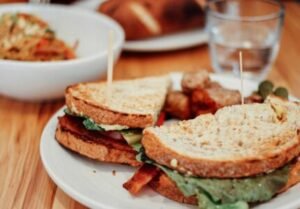Medically reviewed by Dr. Ramesh Gaddam, M.D. — Written by Sumalatha, D.N.H.E
Table of Contents
ToggleSugar and processed foods are often associated with negative health impacts when consumed excessively.
These dietary choices can lead to various health issues, including weight gain, heart problems, increased risk of chronic diseases, and overall poor health.
To improve your well-being and feel healthier, it’s essential to cut down on sugar and processed foods in your diet.
Sugar
Sugar is a type of sweet substance that we find in many foods and drinks.

There are different kinds of sugar, like the natural sugars found in fruits, and added sugars that are put into processed foods and drinks during manufacturing.
High sugar consumption has been linked to weight gain, type 2 diabetes, heart disease, inflammation, and poor dental health.
Monitoring and reducing sugar intake, particularly from processed sources, is crucial for maintaining overall health and well-being.
Daily Recommended Sugar Intake
The daily recommended sugar intake varies depending on factors such as age, sex, activity level, and overall health status.

However, organizations like the American Heart Association (AHA) and the World Health Organization (WHO) provide general guidelines for added sugar intake.
American Heart Association (AHA) Recommendations
The AHA recommends the following daily limits for added sugars:
- For Men: No more than 9 teaspoons or 36 grams per day.
- For Women: No more than 6 teaspoons or 25 grams per day.
World Health Organization (WHO) Guidelines
The WHO suggests that added sugars should ideally make up less than 10% of your total daily energy intake.
For an average adult with a normal body mass index (BMI), this equates to around 50 grams or 12 teaspoons of added sugars per day.
What Counts as Added Sugars?
It’s important to note that these recommendations focus on added sugars, which are sugars and syrups added to foods during processing or preparation.
Natural sugars found in whole foods like fruits, vegetables, and dairy products are not included in these limits because they come with other beneficial nutrients like fiber, vitamins, and minerals.
Why Monitoring Sugar Intake Matters
Monitoring your sugar intake and being mindful of added sugars in processed foods and beverages can help you maintain a balanced diet.
Also reduce the risk of health problems associated with excessive sugar consumption, such as obesity, type 2 diabetes, and heart disease.
Tips for Reducing Sugar Intake
Reducing sugar intake can have significant benefits for your health, including weight management, improved energy levels, and reduced risk of chronic diseases like diabetes and heart disease.

Here are some tips to help you cut down on sugar:
Read Food Labels
Check the nutrition labels on packaged foods and beverages to identify added sugars. Ingredients like sucrose, high-fructose corn syrup, corn syrup, cane sugar, and various other syrups indicate added sugars.
Choose products with little to no added sugars or opt for healthier alternatives.
Choose Whole Foods
Focus on whole, unprocessed foods like fruits, vegetables, lean proteins, whole grains, and nuts.
These foods are naturally low in added sugars and provide essential nutrients your body needs.
Limit Sugary Beverages
Reduce your consumption of sugary drinks such as sodas, fruit juices, energy drinks, sweetened teas, and flavored coffees.
Opt for water, herbal teas, or infused water with fruits or herbs for flavor instead.
Watch Out for Hidden Sugars
Be aware that sugar can be found in unexpected places, including condiments, sauces, dressings, and even seemingly healthy foods like yogurt and granola bars.
Choose options with little or no added sugars, or make your own versions at home.
Cook at Home
When you prepare meals at home, you have more control over the ingredients and can minimize the use of added sugars.
Experiment with recipes that use natural sweeteners like fruits, cinnamon, vanilla, or small amounts of honey or maple syrup.
Use Alternative Sweeteners
Instead of refined sugar, try using natural sweeteners like stevia, monk fruit, erythritol, or xylitol in moderation.
These sweeteners can provide sweetness with fewer calories and a lower impact on blood sugar levels.
Satisfy Sweet Cravings with Fruit
When craving something sweet, reach for fresh fruits like berries, apples, oranges, or bananas.
They contain natural sugars along with fiber, vitamins, and minerals, making them a healthier choice than processed sweets.
Practice Moderation
You don’t have to completely eliminate sugar from your diet, but aim to consume it in moderation.
Enjoy occasional treats mindfully, savoring small portions rather than indulging excessively.
Plan Ahead
Plan your meals and snacks in advance to avoid impulsive choices that may be high in sugar.
Keep healthier options readily available, such as cut-up vegetables, nuts, or homemade snacks, to satisfy hunger without resorting to sugary foods.
Be Patient
Gradually reducing your sugar intake can lead to long-term success.
Be patient with yourself and celebrate small victories along the way. Over time, your taste buds will adjust, and you’ll likely find that you crave sugary foods less frequently.
Summary:
By implementing these tips into your daily routine, you can gradually reduce your sugar intake and improve your overall health and well-being.
Remember that small changes can add up over time, so be patient with yourself as you work towards healthier eating habits.
Processed Foods
Processed foods undergo various alterations from their original form, often containing added sugars, unhealthy fats, and high levels of salt.

Regular consumption of processed foods can increase the risk of obesity, cardiovascular disease, hypertension, and certain cancers.
Additionally, processed foods may lack essential nutrients found in whole, unprocessed foods, contributing to overall poor nutrition and health
Tips for Reducing Processed Foods
Reducing processed food intake can have numerous health benefits, including weight management, improved nutrition, and a reduced risk of chronic diseases.
Here are some tips to help you cut down on processed foods:
Focus on Whole, Unprocessed Foods
Base your diet around whole foods such as fruits, vegetables, lean proteins (like poultry, fish, beans, and tofu), whole grains, nuts, and seeds.
These foods are naturally nutrient-rich and lower in additives compared to processed options.
Read Ingredient Lists
When purchasing packaged foods, read the ingredient list carefully. Choose products with fewer ingredients, and avoid those with long lists of additives, preservatives, artificial flavors, and colors.
Cook at Home
Prepare meals at home using fresh ingredients whenever possible.
Cooking from scratch allows you to control the quality and quantity of ingredients in your meals, reducing your intake of processed foods.
Meal Prep
Dedicate some time each week to plan and prepare meals in advance.
This can help you avoid the temptation of convenience foods when you’re short on time or energy during the week.
Limit Convenience Foods
Minimize your reliance on convenience foods such as frozen dinners, pre-packaged snacks, and fast food.
While convenient, these options tend to be high in unhealthy fats, sodium, and added sugars.
Choose Frozen or Canned Foods Wisely
Not all frozen or canned foods are heavily processed.
Opt for frozen fruits and vegetables without added sauces or syrups, and choose canned goods with no added sugars or excess sodium.
Look for options labeled “no added sugar,” “low sodium,” or “no preservatives.”
Be Mindful of Condiments and Sauces
Many condiments and sauces are loaded with sugar, salt, and artificial additives.
Make your own dressings, marinades, and sauces using simple ingredients like olive oil, vinegar, herbs, and spices.
Snack Smart
Instead of reaching for processed snacks like chips, cookies, or candy bars, choose healthier alternatives such as fresh fruit, vegetables with hummus or nut butter, Greek yogurt, air-popped popcorn, or homemade trail mix.
Stay Hydrated with Water
Drink plenty of water throughout the day to stay hydrated and avoid sugary beverages like soda, sweetened teas, and energy drinks.
If you need flavor, try infusing water with fresh fruit, herbs, or cucumber slices.
Read Labels Carefully
Learn to decipher food labels and nutritional information.
Pay attention to serving sizes, calories, and the amounts of sugar, sodium, and unhealthy fats in processed foods.
Aim to choose options with lower amounts of these ingredients.
By gradually reducing your consumption of processed foods and incorporating more whole, nutrient-dense foods into your diet, you can improve your overall health and well-being over time.
Health Concerns
Excessive consumption of sugar and processed foods has been linked to a myriad of health issues, ranging from obesity and diabetes to heart disease and even certain types of cancer.

Weight Gain and Obesity:
Sugary foods and processed snacks are often high in calories and low in essential nutrients.
Consuming them regularly can lead to weight gain and ultimately contribute to obesity, which in turn increases the risk of various chronic diseases.
Type 2 Diabetes:
Foods rich in added sugars and refined carbohydrates can cause blood sugar levels to spike, leading to insulin resistance over time.
This can eventually progress to type 2 diabetes, a serious condition that requires lifelong management.
Heart Disease:
Diets high in sugar and processed foods have been associated with an increased risk of heart disease.
Excessive sugar consumption can raise blood pressure, triglyceride levels, and LDL (bad) cholesterol, all of which are risk factors for heart disease.
Inflammation:
Processed foods often contain unhealthy fats, artificial additives, and preservatives that can trigger inflammation in the body.
Chronic inflammation has been linked to various health problems, including arthritis, autoimmune diseases, and digestive disorders.
Poor Dental Health:
Sugary snacks and beverages can wreak havoc on our dental health, leading to cavities, tooth decay, and gum disease.
The bacteria in our mouths thrive on sugar, producing acids that erode tooth enamel and cause oral health issues.
Benefits of Limiting Sugar and Processed Foods
Given the alarming health concerns associated with excessive sugar and processed food consumption, it’s clear that making healthier dietary choices is essential for our overall well-being.

By reducing our intake of these harmful substances, we can:
Improve Physical Health:
Cutting back on sugar and processed foods can help lower the risk of obesity, diabetes, heart disease, and other chronic conditions, leading to better overall physical health and longevity.
Boost Energy Levels:
While sugary snacks may provide a temporary energy boost, they often lead to crashes later on.
Choosing whole, nutrient-rich foods instead can provide sustained energy levels throughout the day, enhancing productivity and vitality.
Enhance Mental Well-being:
Research suggests that a diet high in sugar and processed foods may negatively impact mental health, increasing the risk of depression, anxiety, and mood swings.
Opting for a balanced diet rich in fruits, vegetables, and lean proteins can support better mental well-being.
Promote Longevity:
By adopting a diet centered around whole, unprocessed foods and minimizing our consumption of sugar and processed snacks, we can support our body’s natural ability to thrive and resist disease, ultimately promoting a longer and healthier life.
Conclusion
In conclusion, while sugar and processed foods may be tempting, their negative effects on our health far outweigh any momentary pleasure they provide.
By being mindful of our dietary choices and prioritizing whole, nutrient-dense foods, we can safeguard our well-being and enjoy a happier, healthier life.
Tips for Identifying Processed Foods
When shopping for groceries, pay attention to food labels and ingredient lists.

Processed foods often contain a long list of additives, preservatives, and artificial ingredients.
Choose whole foods whenever possible and opt for minimally processed options with simple, recognizable ingredients.
Prioritize Whole, Nutrient-Dense Foods:
Base your diet around whole, unprocessed foods such as fruits, vegetables, lean proteins, whole grains, nuts, and seeds.
These foods provide essential nutrients, including vitamins, minerals, fiber, and healthy fats, while minimizing the intake of added sugars and unhealthy additives found in processed foods.
Balance and Moderation:
While it’s important to limit sugar and processed foods in your diet, remember that balance and moderation are key.
Enjoy occasional treats mindfully, savoring small portions rather than indulging excessively.
Focus on building a diverse and balanced diet that includes a variety of nutrient-dense foods from all food groups.
Behavioral Strategies:
In addition to making dietary changes, consider incorporating behavioral strategies to support long-term success.
Practice mindful eating by paying attention to hunger and fullness cues, savoring each bite, and avoiding distractions while eating.
Set realistic goals, overcome food cravings with healthier alternatives, and seek support from friends, family, or online communities to stay motivated on your journey towards healthier eating habits.
Practical Lifestyle Changes
By implementing following practical lifestyle changes and making mindful dietary choices, you can reduce your intake of sugar and processed foods, improve your overall health and well-being, and enjoy a happier, healthier lifestyle.

Meal Planning and Preparation:
Dedicate time each week to plan your meals and prepare healthy options in advance.
This helps you avoid last-minute decisions that may lead to unhealthy choices, such as grabbing fast food or processed snacks.
Portion Control:
Be mindful of portion sizes to prevent overeating, especially when it comes to sugary and processed foods.
Use smaller plates and bowls, and pay attention to serving sizes listed on packaging.
Hydration with Water:
Stay hydrated by drinking plenty of water throughout the day. Opt for water over sugary beverages like soda or energy drinks.
Flavor water with fresh fruit or herbs for a refreshing twist.
Quality Sleep:
Prioritize getting enough sleep each night to support overall health and well-being.
Aim for 7-9 hours of sleep and establish a consistent bedtime routine to improve sleep quality.
Regular Exercise:
Incorporate physical activity into your daily routine to boost energy levels, improve mood, and support weight management.
Find activities you enjoy, whether it’s walking, cycling, dancing, or yoga, and aim for at least 150 minutes of moderate-intensity exercise per week.
Mindful Eating:
Practice mindful eating by paying attention to hunger and fullness cues, savoring each bite, and avoiding distractions like screens or work while eating.
This can help prevent overeating and promote a healthier relationship with food.
Stress Management:
Implement stress-reducing techniques such as deep breathing, meditation, yoga, or spending time in nature.
Chronic stress can lead to emotional eating and unhealthy food choices, so finding ways to manage stress is essential for overall well-being.
Social Support:
Surround yourself with supportive friends, family members, or online communities who share similar health goals.
Having a support system can provide encouragement, accountability, and motivation on your journey to adopting healthier lifestyle habits.
Summary:
By implementing these practical lifestyle changes, you can gradually reduce your reliance on sugary and processed foods and adopt healthier habits that support your overall well-being.
Small, consistent steps toward healthier choices can lead to significant improvements in your health and quality of life over time.
Medically reviewed by Dr. Ramesh Gaddam, M.D.

General Physician, Diabetologist, and Critical Care Specialist.
Related
Discover more from Health Build-Up
Subscribe to get the latest posts sent to your email.

1 thought on “10 Best Tips to Limit Sugar and Processed Foods”
Comments are closed.